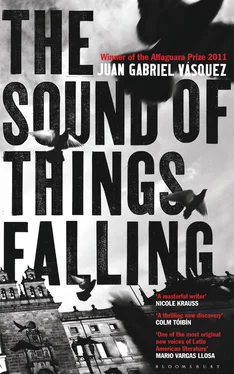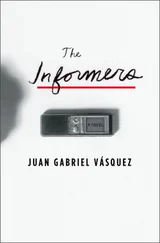Barbieri had already been in the Peace Corps in Colombia for two years, but before that he’d spent another two in Mexico, working with campesinos between Ixtapa and Puerto Vallarta and before Mexico he’d spent several months in the poor neighbourhoods of Managua. He was tall, wiry, fair but tanned, and it wasn’t unusual to find him shirtless (a wooden crucifix hanging invariably round his neck), wearing Bermuda shorts and leather sandals and nothing else. He’d welcomed Elaine with a beer in one hand and in the other a plate of small arepas of a texture that was new to her. Elaine had never met anyone so talkative and at the same time so sincere, and in a few minutes she found out he was about to turn twenty-seven, his team was the Cubs, he hated aguardiente and that that was a problem here, that he was afraid, no, absolutely terrified of scorpions and he advised Elaine to buy open shoes and check them carefully every morning before putting them on. ‘Are there a lot of scorpions here?’ asked Elaine. ‘There can be, Elaine,’ said Barbieri in the voice of a fortune-teller. ‘There can be.’
The apartment had two bedrooms, a living room and hardly any furniture, and was on the second floor of a house with sky-blue walls. On the first floor there was a shop with two aluminium tables and a counter — caramel candies, corn cakes, Pielroja cigarettes — and behind the shop, where as if by magic the world became a domestic one, lived the couple who ran it. Their surname was Villamil; their age was somewhere above sixty. ‘My señores,’ said Barbieri when he introduced them to Elaine, and, realizing that his señores hadn’t understood the name of the new tenant, he told them in good Spanish: ‘She’s a gringa , like me, but she’s called Elena.’ And that’s how the Villamils referred to her: that’s what they called her to ask if she had enough water, or to get her to come and say hello to the drunks. Elaine put up with it stoically, missed the Laverdes’ house, was ashamed of her spoilt little girl thoughts. In any case, she avoided the Villamils whenever possible. A concrete stairway on the exterior wall of the building allowed her to leave without being seen. Barbieri, affable to the point of impertinence, never used it: there was never a day he didn’t stop in at the shop to tell them about his day, his achievements and failures, to hear the anecdotes the Villamils and even their customers had to tell, and to try to explain to those old campesinos the situation of the blacks in the United States or the theme of a song by The Mamas & the Papas. Elaine, in spite of herself, watched him do this and admired him. She took longer than she should have to discover why: in a way, this extroverted and curious man, who looked at her brazenly and talked as if the world owed him something, reminded her of Ricardo Laverde.
For twenty days, the twenty hot days that her rural apprenticeship lasted, Elaine worked shoulder to shoulder with Mike Barbieri, but also beside the local leader of Acción Comunal, a short, quiet man whose moustache covered his harelip. He had a simple name, for a change: he was called Carlos, just Carlos, and there was something hermetic or menacing in that simplicity, in that lack of a surname, in the phantasmal way he’d appear to collect them in the mornings and disappear again in the afternoons, after dropping them off. Elaine and Barbieri, out of some sort of previous agreement, had lunch at Carlos’s house, an interregnum between two intensive work sessions with the campesinos in the surrounding villages, interviews with local politicians, ever fruitless negotiations with landowners. Elaine discovered that all the work in the countryside was done by talking: to teach the campesinos to raise chickens with tender flesh (keeping them in enclosures instead of letting them run around wild), to convince the politicians to build a school using local resources (since nobody expected anything of the central government) or to try to get the rich to see them as more than simply anticommunist crusaders, they first had to sit round a table and drink, drink until they didn’t understand the words any more. ‘So I spend my days on the backs of decrepit horses or talking to half-drunk people,’ Elaine wrote to her grandparents. ‘But I think I’m learning, although without really noticing. Mike explained that in Colombian Spanish this is called cogerle el tiro of something. Understanding how things work, knowing how to get them done, all that. Getting the hang of things, we might say. That’s what I’m doing. Oh, one little thing: don’t write to me here any more, send the next letter to Bogotá. I’m going back to Bogotá soon and will spend a month there on the final details of my training. Then to La Dorada. There I start the serious stuff.’
Her last weekend there Ricardo Laverde arrived. He came by surprise, arranging it all himself, taking the train to La Dorada on his own and from there getting to Caparrapí by bus and then asking around for directions, describing the gringos whose existence, of course, everybody for miles around knew about. It didn’t strike Elaine as at all strange that Ricardo Laverde and Mike Barbieri should get along so well: Barbieri gave Elaine the afternoon off to show her bogotano boyfriend around (that’s what he called him, her novio bogotano ) and said he’d see them in the evening, for dinner. And that night, in a matter of hours — hours spent, truth be told, in the middle of a field, around a campfire and in the presence of a jug of guarapo — Ricardo and Barbieri discovered how much they had in common, because Barbieri’s father was an airmail pilot and Ricardo didn’t like aguardiente , and they hugged and talked about planes and Ricardo opened his eyes wide as he talked about his courses and his instructors, and then Elaine interrupted to praise Ricardo and repeat the praise others had offered of his talent as a pilot, and then Ricardo and Mike talked about Elaine right in front of her, what a nice girl she was and how pretty, yes, pretty too, with those eyes, said Mike, yes, especially the eyes, said Ricardo and told secrets as if instead of having just met they’d roomed together in a frat house, and sang For she’s a jolly good fellow and regretted in tandem that Elaine had to go to another site, this site should be your site, fuck La Dorada, fuck The Golden One, fuck it all the way , and they drank a toast to Elaine and to the Peace Corps, for we’re all jolly good fellows, which nobody can deny . And the next day, in spite of the hangovers, Mike Barbieri accompanied them in person to catch the bus. The three of them arrived in the village plaza on horseback, like colonialists of times gone by (although theirs were squalid old nags, which would never have served colonialists of times gone by), and on Ricardo’s face, as he politely carried her luggage, Elaine saw something she’d never seen before: admiration. Admiration for herself, for the ease with which she moved through the village, for the affection she’d earned from the people in three short weeks, for the natural and yet undeniably authoritative way she made herself understood by the locals. Elaine saw that admiration in his face and felt that she loved him, that she’d unexpectedly started to feel new and more intense things for this man who also seemed to love her, and at the same time felt that she’d arrived at a happy point: when this place could no longer surprise her too much. True, there would always be contingencies, in Colombia people always managed to be unpredictable (in their behaviour, in their manners: one never knew what they were actually thinking). But Elaine felt in charge of the situation. ‘Ask me if I’ve got the hang of things here,’ she said to Ricardo as they climbed aboard the bus. ‘Have you cogido el tiro a la vaina , Elena Fritts?’ he asked. And she answered, ‘Yeah. I’ve got the hang of things here.’
Читать дальше












